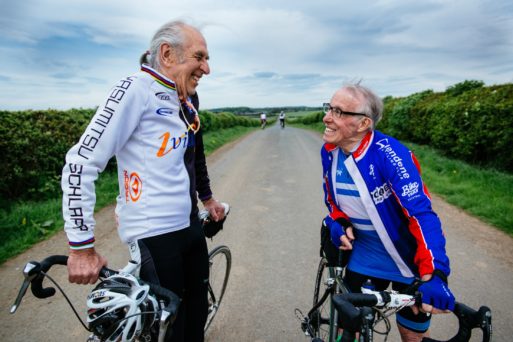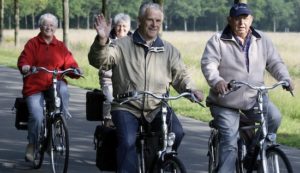A new study out of the United Kingdom finds that exercising regularly throughout one’s lifetime can potentially slow down the aging process.
The study concludes that older adults who exercised for a majority of their lifetime had the same immunity, muscle mass and cholesterol levels as young people. Researchers from the University of Birmingham and King’s College London published the findings in the journal Aging Cell as a result of an ongoing, joint study.

Credit: northleedslifegroup.com
Researchers tested the muscles and immune systems of 125 middle-aged and elderly cyclists who’d exercised throughout their lives. The subjects ranged in age from 55 to 79. Eighty-four participants were male and 41 were female, and they were all highly-active riders. The men had to be able to traverse 100 kilometers (about 62 miles) in under six and a half hours, while the females had to cycle 60 kilometers (about 37 miles) in five and a half hours. People who drank heavily, smokers and those with high blood pressure or other health issues were not allowed to take part in the study.
The cyclists were subjected to numerous laboratory tests to determine their health levels. Their results were then compared to 75 healthy adults of the same age who did not exercise regularly, as well as 55 healthy young adults aged 20 to 36 who did not exercise.
According to the study, the cyclists did not lose significant muscle mass or strength, and had neither elevated body fat nor cholesterol levels. Testosterone levels in the male participants remained high as well. The cyclists also had “young” immune systems compared to those who did not exercise throughout their lifetime.
Immune system health was determined by thymus productivity. The thymus is an organ that creates T cells, a type of immune cell. The organ begins to shrink after we turn 20, making fewer T cells in the process. However, the thymuses of the cyclists involved in the study produced as many T cells as those of a young person. Essentially, the cyclists looked “the same age” in biological terms as the 20-to-36-year-old group.
“It really tells us that staying physically active all of your adult life can prevent much of what we think of as aging, including immune aging,” said Janet Lord, director of the Institute of Inflammation and Ageing at the University of Birmingham.
The study suggests that what we consider “normal” aspects of aging (muscle loss, immune system decline, etc.) could result from a lack of exercise, not simply getting older.
Exercise And Aging
This study is more proof that exercising regularly is a necessity for long-term health. Though the findings here are in no way absolute, they are some of the newest additions to a long list of exercise-friendly research.

Credit: dutchnews.nl
“The findings emphasise (sic) the fact that the cyclists do not exercise because they are healthy,” said Professor Stephen Harridge, Director of the Centre of Human & Aerospace Physiological Sciences at King’s College London, “but that they are healthy because they have been exercising for such a large proportion of their lives…Their bodies have been allowed to age optimally, free from the problems usually caused by inactivity. Remove the activity and their health would likely deteriorate.”
Studies continually tout the benefits of exercise for both physical and mental health. A sedentary lifestyle can contribute to numerous health problems. The amount of time spent sitting at regular, prolonged intervals, regardless of work-out routines, can wreak havoc on our bodies.
A study published this past December highlighted the ways in which regular exercise could stave off the onset of mild cognitive impairment (MCI). MCI oftentimes develops into dementia.
With all the research being conducted regarding exercise and our health, it’s safe to say everyone can benefit from an active lifestyle.

 Exercising Regularly Throughout Our Lifetime Can Minimize Effects of Aging
Exercising Regularly Throughout Our Lifetime Can Minimize Effects of Aging


 “Help Me, Helen”
“Help Me, Helen”

 “As Tears Go By” by Marianne Faithfull
“As Tears Go By” by Marianne Faithfull














